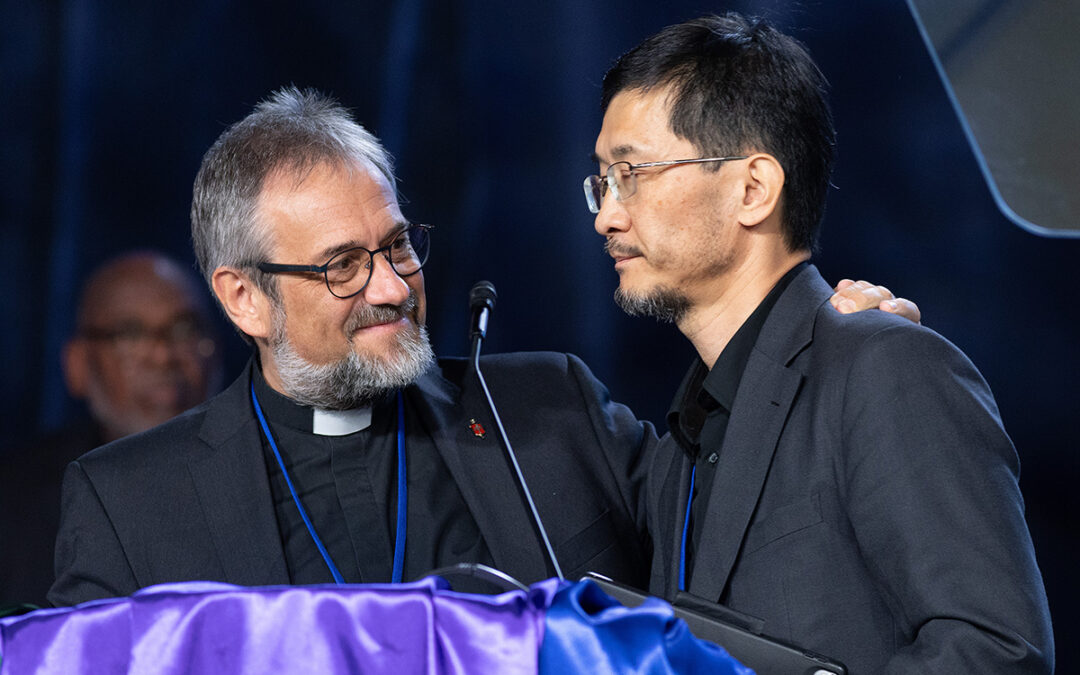
by Steve | Jul 5, 2024 | July-August 2024
Eurasia Granted Disaffiliation, Liberia Denied
By Sam Hodges, UM News
July/August 2024
Early in its Charlotte deliberations, the Standing Committee on Central Conference matters nearly overwhelmingly approved a petition enabling four Eurasian annual conferences to leave The United Methodist Church.
The four conferences had submitted to the committee a constitution and main doctrinal standards for a new, autonomous church to be called The Christian Methodist Church in Eurasia.
The planned departure has long been in the works and owes, in part, to the predominant traditionalist theology in those areas and tensions with other annual conferences in the Northern Europe and Eurasia Central Conference.
The conferences plan to leave under Paragraph 572 of the United Methodist Book of Discipline, which deals with conferences outside the U.S. that want to become autonomous.
Bishop Eduard Khegay leads the Eurasia Episcopal Area and has signaled his own intention to leave The United Methodist Church. He spoke to the committee after its vote to approve the enabling petition.
“This is for us like leaving home,” Khegay said. “My hope is we can keep the friendships and relationships whenever it’s possible. … We want to remain your sisters and brothers.”
“We feel both the pain of leaving and also the grace of the way this could happen,” Bishop Harald Rückert said, noting that a sub-group of the standing committee had a key role in working with the Eurasian conferences as they sought autonomy.
The standing committee rejected a petition that would create a new disaffiliation path for annual conferences in the central conferences. The sponsor, the Rev. Julius Nelson of the Liberia Conference, was allowed to speak to the committee but the vote went solidly against his petition.
Sam Hodges is a news writer for United Methodist News Service. Image: Bishop Harald Rückert (left) of Germany puts his arm around Bishop Eduard Khegay after delegates to the United Methodist General Conference in Charlotte, N.C., voted on April 25 to allow the four conferences that Khegay oversees in the Eurasia Episcopal Area to leave the denomination. Photo by Mike DuBose, UM News.
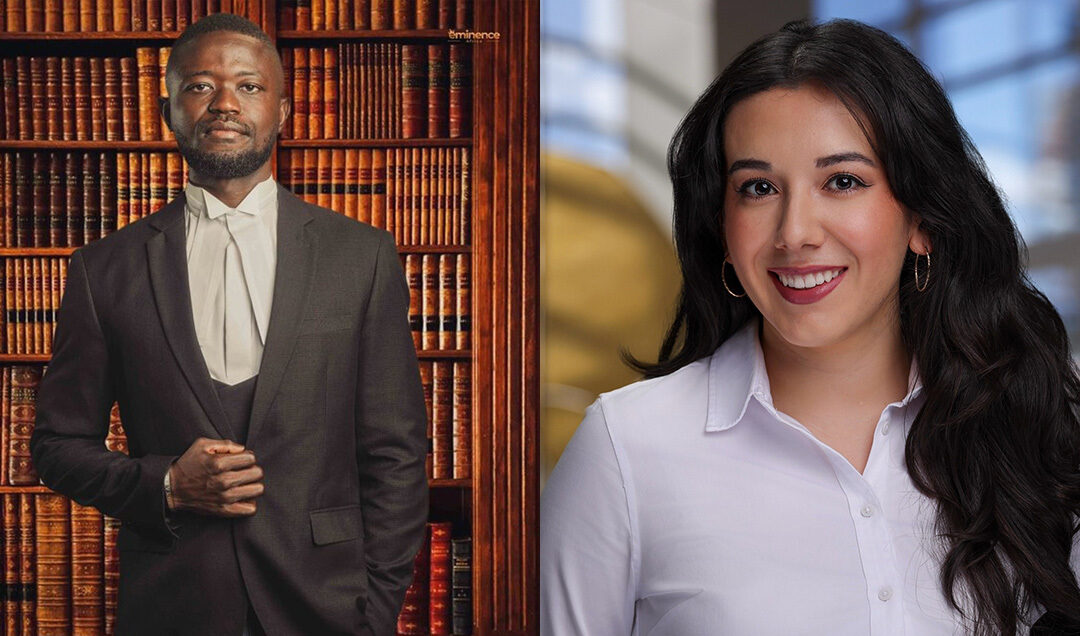
by Steve | Jul 5, 2024 | July-August 2024
Young People’s Address
By Eveline Chikwanah
To thunderous applause, Alejandra Salemi of the Florida Conference said the denomination’s lawmaking assembly is being held “in the midst of what feels like an emotional whirlpool that only something like divorce proceedings can stir up.”
…Over the past four years, more than 7,600 U.S. congregations have disaffiliated from The United Methodist Church.
“When time and money and energy go towards a divorce, it has to get subtracted from somewhere else, and I believe that our young people and local congregations are paying that price while resources go toward settling disagreements,” Alejandra Saemi (FL) said.
She said what is happening in the church is a microcosm to what is happening in the rest of the world and the most difficult thing to hear in an echo chamber is the quiet, knowing voice of the truth: God’s loving whisper that reminds people “to be still and know.”
Across the ocean, Senesie T.A. Rogers, who was unable to get a visa to travel to the U.S from his home in Sierra Leone, delivered his recorded address, reminding delegates that splits were normal in the Methodist Church.
“An inconvenient truth in our tradition is that the seeds needed to explore dividing the church were planted in the first General Conference in 1792, which was attended only by clergy. We have thereafter felt the effects of nine splits and one major schism in the first 100 years, or so, of the Methodist Church,” Senesie T.A. Rogers said.
Because of that history, he said, it is pointless to worry about splits and their effects when we already know that splits and Methodism are intertwined.
“Do you know that there is something else that is part of our tradition? Indeed. Reconciliation and coming together is part of our tradition. We must be more about uniting than dividing at this point,” Rogers said.
Chikwanah is a correspondent for UM News based in Harare, Zimbabwe. Image: Senesie Timothy Arounah Rogers, native of Sierra Leone, the Chairman of the United Methodist West Africa Central Conference Organization on Youth and Young Adults; and Alejandra Salemi, a PhD student at Duke University (photo from UMCYoungPeople.org)
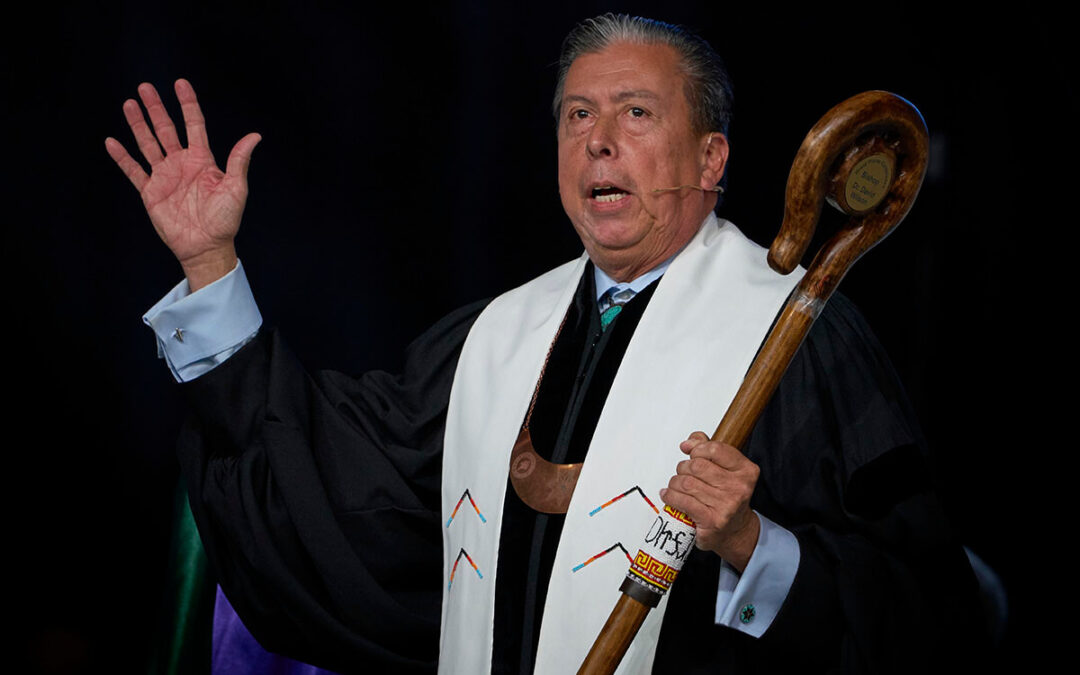
by Steve | Jul 5, 2024 | July-August 2024
Bishop Wilson: Inspire Next 7 Generations
By Todd Seifert
Bishop David Wilson, the denomination’s first Native American bishop, encouraged General Conference delegates to consider the people who inspired their faith in the past while considering how decisions today can inspire United Methodists far into the future.
During the morning worship May 1, Wilson, who leads the Great Plains Conference, drew upon Indigenous cultures and his background working at General Conferences of the past.
An ensemble from the Oklahoma Indian Missionary Conference, where Wilson served before his historic episcopal election in November 2022, sang and highlighted a segment of the church often overlooked despite its long history with Methodism.
Many of the Native people relocated to present-day Oklahoma brought the Methodist theology of Christianity with them in the 1840s. The bishop, now serving the Great Plains Conference, showed delegates a design of footprints on his crozier that symbolizes the deadly trek from the southeastern United States to what is now Oklahoma.
Wilson encouraged delegates to remember the constituents they serve. “We come from four continents, speaking more than 10 languages,” he said. “We come with the commonality of our belief and service to Jesus Christ and the world. And we are also here because we believe in the life and future of this United Methodist Church. My friends, we have much more in common than not.”
Wilson shared Hebrews 13:7-8, CEB: “Remember your leaders who spoke God’s word to you. Imitate their faith as you consider the way their lives turned out. Jesus Christ is the same yesterday, today and forever!”
The bishop, wearing special white moccasins given to him by the Rev. Thomas Roughface, who preceded Wilson as the superintendent of the OIMC, recalled growing up in a Native Methodist congregation in Muskogee, Oklahoma, and how he was nurtured there by adults — including a pastor who recognized God’s call on Wilson’s life.
“I remember those leaders so often, those who first taught me about the Creator God, about faith, love, forgiveness and more,” Wilson said. “Most of all, I remember their witness of how they cared and loved others and modeled and taught me to be proud of my culture.”
Wilson acknowledged the period of disaffiliation that took such a large toll on the denomination. While noting the pain and challenges that resulted in approximately 25% of American congregations leaving The United Methodist Church, Wilson also expressed amazement at the tenacity and faithfulness of laity across the connection who chose to remain, even when their local church decided to leave.
He shared the story of one congregation in Imperial, Nebraska, a town of about 2,000 people in the far southwestern portion of the state. The move to disaffiliate passed by a single vote, leaving about half of the congregation to either give in or move on.
They decided to start something new. The bishop shared a quote from a story told on the Great Plains Conference website.
“We had to make the decision not only to remain United Methodist, with the theology and all the things that went with that, but we had to think about what was important to us. Was the building and the cross and the Bibles and the piano — were those the things that were going to make us stay there? Or was the way we believe and the things we find important, were those the things that were going to make us leave?”
“The people were happy,” Wilson recalled, “and I could tell they meant what they said earlier: It was their belief in Christ and all that was important to their faith that kept them there as United Methodists.”
The commonalities shared by the people in the new congregation — and their love for all people — led to a recollection of a dinner Wilson had with a group of clergy from Great Plains. He described sitting at the table with Kenyans, Koreans and Anglos. The host, the Rev. Anne Gatobu, who is from Kenya, explained the African Christian perspective of loving neighbors known as “Ubuntu.”
Wilson learned that Ubuntu spotlights the humanness found in being with others. He said when someone pulls away to pursue their own interest, the life-giving force found in the interwovenness of life experiences is lost.
“Because of Ubuntu,” Wilson said, “the message of love in Africa has been preached with great ease and effectiveness as it resonates with the innermost being of people.”
Wilson, who often shares the way Indigenous cultures look far into the future as they consider decisions, closed with a story from the six tribes that make up the Haudenosaunee Confederacy in the northeastern United States.
When major decisions must be made, Wilson said, care and attention go into not only thinking about the ramifications for the present or even a year later. Instead, thought is given to what the results of a decision could be to people living seven generations down the road.
“You heard that correctly: the next seven generations,” Wilson said. “What would that look like if we made plans, looking ahead seven generations and how these decisions affect all people? Can you imagine how that would impact this denomination and, most importantly, this world?”
The service concluded with a time of remembrance of bishops, spouses and delegates who have died since the last General Conference.
Todd Seifert is communications director in the Great Plains Conference. Image: Bishop David Wilson, the first Native American to be elected a United Methodist bishop, preaches on May 1 during morning worship at the United Methodist General Conference in Charlotte, N.C. Photo by Paul Jeffrey, UM News.
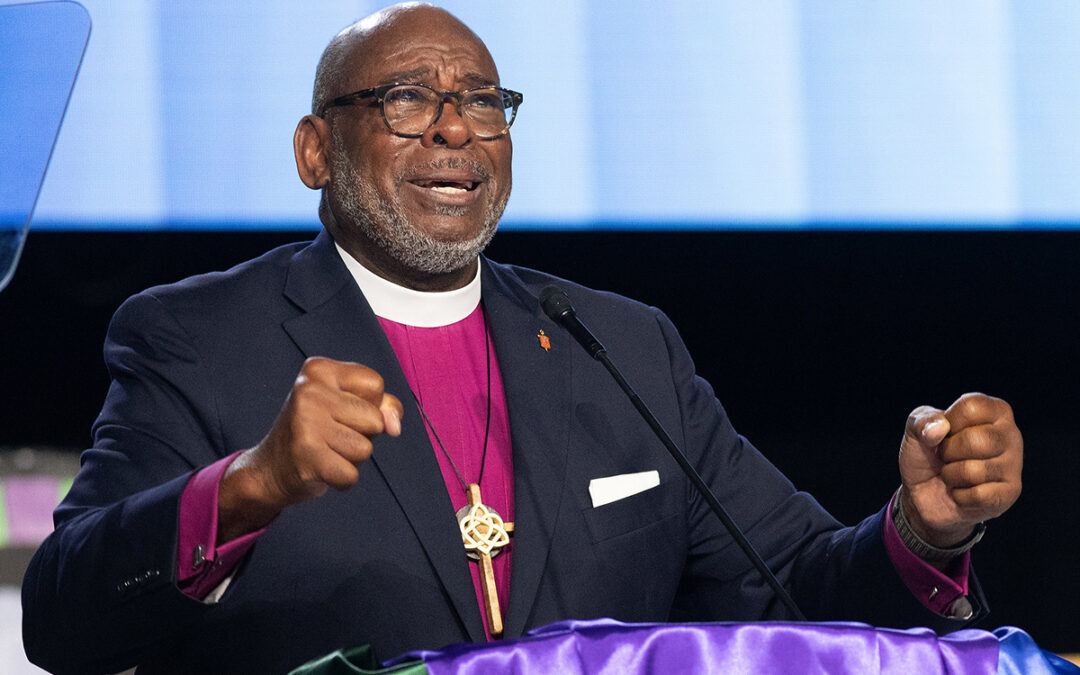
by Steve | Jul 5, 2024 | July-August 2024
Bishop Holston: Become “who God Needs Us to Be”
By Jessica Brodie
Bringing a word on staying who “God needs us to be” in spite of the ever-changing noise of this world, Bishop L. Jonathan Holston of the South Carolina Conference delivered the Council of Bishops’ Episcopal Address to kick off Day 2 of the General Conference.
“When things are happening all around us, God uses the church to make a difference,” Holston proclaimed before the crowd of delegates, observers and volunteers gathered at the Charlotte Convention Center April 24. “The church was never built for our pleasure. The church is built for God’s purpose.”
Holston was selected by the Council of Bishops to deliver the address on their behalf. The council comprises 59 bishops presiding over conferences and episcopal areas across the globe, as well as retired bishops.
Holston opened the address with a prayer calling on God to create a clean heart and renew a right spirit within United Methodists as they strive to put love first.
“When the world shouts hate, help us to love,” Holston prayed. “When the past won’t let go, help us to love. When we feel broken, betrayed or rejected, help us to love. Even when it seems impossible or doesn’t make sense, help us to love.”
He shared how so much has happened since an episcopal address was last delivered at General Conference 2016, eight years ago.
Citing wisdom from former United States ambassador and pastor Andrew Young, Holston noted the paradox of humanity can be described in this way: “We live in the tension of who we are, who we say we are and who we want to be.”
As a lengthy montage displayed examples onscreen, Holston reviewed the changes that have occurred in the church and the world since General Conference last met — the highs and lows, the opportunities and challenges, the tensions as people of faith pivot between the best and the worst of human nature.
“Since 2016, TikTok launched, Saudi Arabia legalized women driving, the northern white rhino became extinct, Notre Dame burned, ChatGPT was created, elephants are being studied to treat cancer,” Holston said.
The list goes on: Elections. Natural disasters. Terrorist attacks. Good things and bad.
Yet amid what Holston called this “noisy backdrop of world events,” God’s people still did what they could across the world to be God’s church.
He lifted up numerous examples of this, from baptisms and new churches rising up to powerful mission work done in the name of the Lord to fight trafficking, provide economic opportunity and deliver desperately needed medical care in remote areas.
“We fall short,” Holston said. “Yet even in our shortcomings as imperfect humans, we strive for who we want to be — holding before us the vision of God’s kingdom built, the hope of Christ fulfilled, as we move toward that vision with courage. All of this because we know that God prevails — the victory has already been won in the death and resurrection of Jesus Christ.”
He urged delegates and other United Methodists to keep their focus on what is important as they tune out the noise.
“Friends, this is who God needs for us to be,” Holston said, urging all gathered to continue God’s work in the midst of divisive, joyful and sometimes terrible situations.
Striving to be who God needs us to be should be the only priority, he said.
Glancing backward is fine, but the focus must be the future, he said. “There’s a reason that rearview mirror is so much smaller than the windshield itself. We are only meant to glance backward. We are meant to fix our gaze ahead, following where Christ leads.”
Where Christ leads is God’s kingdom, Holston said, and it’s being built now. And even though church members may be uncertain about exactly what this looks like, they must press on, surrendering to God’s will in the busy circumstances surrounding them.
“We sometimes fall into thinking that if we have God’s peace, then there will be no tension, no conflict, no issues to face,” Holston said.
But this world will always have tension and conflict. And just as pilots must train to fly the plane in spite of what they face in the sky, “They have to fly the plane, set their bearings and don’t lose sight … There is no room for fear or doubt when the plane is in the air.”
Jessica Brodie is the editor of the South Carolina United Methodist Advocate. Image: Bishop L. Jonathan Holston gives the Episcopal Address during the United Methodist General Conference April 24 in Charlotte, N.C. Holston, who leads the South Carolina Conference, encouraged delegates to tune out the noise and focus on God’s work. Photo by Mike DuBose, UM News.
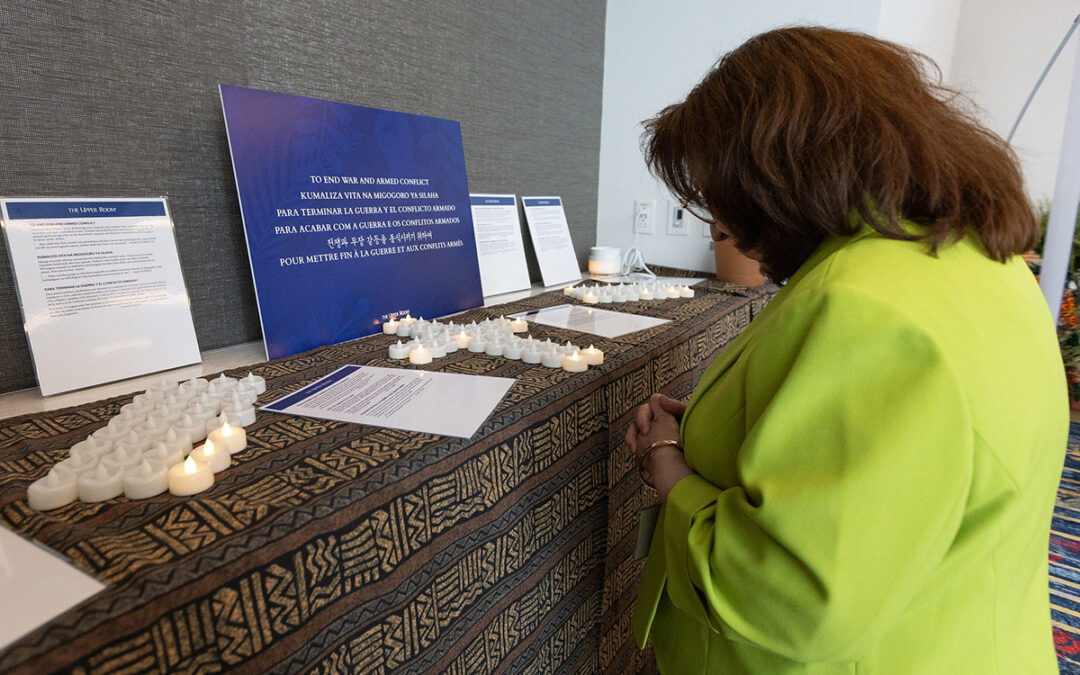
by Steve | Jul 5, 2024 | July-August 2024
Prayer Room was Sanctuary for Delegates
By Audrey Stanton-Smith
At the end of a quiet hallway on the upper floor of the Charlotte Convention Center, delegates and visitors find space to pray.
“It is quiet, and it’s sort of away from everybody,” said Amy Steele, dean of the chapel and executive director of program ministries for The Upper Room. “And, yes, it is a walk down the hallway, but that’s a chance to let go, breathe deeply, center and prepare yourself for prayer. It is an escape not just from the external noise, but (also) the internal noise.”
Karen Hayden knows how important such a space can be.
“In 2016, I was a delegate, and I stumbled upon that dedicated space. I went back to it regularly while at General Conference,” said Hayden, a member of the Missouri Conference. A certified spiritual director, she returned this year as one of 42 prayer room volunteers. “It was helpful. Comfortable. I just remember feeling refreshed.”
The “Cultivating the Garden of the Heart” prayer room at E222 was open to all and included prompts and Scriptures in Portuguese, Korean, French, Spanish and Kiswahili.
“A prayer room at General Conference is absolutely essential because our work needs to be a practice of holy conferencing and discernment, and you can’t do holy conferencing and discernment by resolutions and votes,” said Thomas Albin, a prayer room volunteer and former dean of the chapel for The Upper Room.
Hosted by The Upper Room and sponsored by Wesleyan Impact Partners, the United Methodist Foundation of Western North Carolina, Oklahoma Methodist Foundation and United Methodist Foundation of North Carolina, the prayer room featured three dedicated prayer altars and eight prayer stations with Scripture-based activity prompts.
Prayer altars with kneeling benches on loan from New Market United Methodist Church in Greensboro, North Carolina, were dedicated to prayer for an end to sexual violence and human trafficking, an end to war and armed conflict, and prayer “for a hope that hopes beyond hope.”
Prayer stations are “opportunities to connect on a deeper level with Scripture,” Steele explained. “So, there is opportunity to just say a prayer, alone or with someone, or you can give yourself over to a different kind of prayer experience at each of the stations.”
For example, the “Tending Wilted Leaves” station references Psalm 1:3 and invited visitors to write a prayer request “for an area of your life where you feel you are wilting” on a leaf-shaped slip of paper and pin it to a tree while asking God to hear your prayers and water your life and the life of the church.
“Chasing the Foxes” refers to Song of Solomon 2:15 and invites participants to name their foxes — a habit, attitude or obsession — “that is running wild in your vineyard.” A small cage on the table invites participants to lock those foxes away, “out of the garden of your mind and heart and out of the church.”
Other stations invite visitors to remember baptism, bloom in God’s abundance, pray for God’s guidance and simply rest in God’s grace. Visitors may opt to remove shoes, take a pair of socks from a basket and take a reflective walk around a labyrinth rug. Others may enjoy watching a sugar cube dissolve into a fish bowl seascape as they consider “living forgiveness.”
“The sugar cube is a chance to think about your sin, and when you drop your sugar cube into the water, it’s like casting your sins into the sea of forgiveness,” Steele explained.
The prayer room also offered spiritual guidance in the form of 50-minute, one-on-one sessions with certified spiritual directors. Conference attendees interested in a free private session in a curtained-off space simply sign up for an available time slot at the prayer room’s entrance.
“Our intent with the spiritual directors is not to direct anyone,” Steele said. “It is just to sit and listen to them and whatever issues or concerns they may have. It is just a chance to help them process.”
Melinda Trotti, a volunteer spiritual director from Michigan, said her training has reminded her to remind others that God is God regardless of what happens in the business of The United Methodist Church.
“The spiritual direction time is whatever people want it to be,” Trotti said. “We’re here to support, to pray with people if they want that, and to ask helpful questions.”
“No agenda,” Hayden added. “Just a space to listen.”
Audrey Stanton-Smith is editor of United Women in Faith’s Response magazine. Image: Norma Villagrana of the Western North Carolina Conference prays at an altar in the General Conference prayer room in Charlotte, N.C. The “Cultivating the Garden of the Heart” prayer room is sponsored by The Upper Room and includes prompts and Scriptures in Portuguese, Korean, French, Spanish and Kiswahili. Photo by Mike DuBose, UM News.





